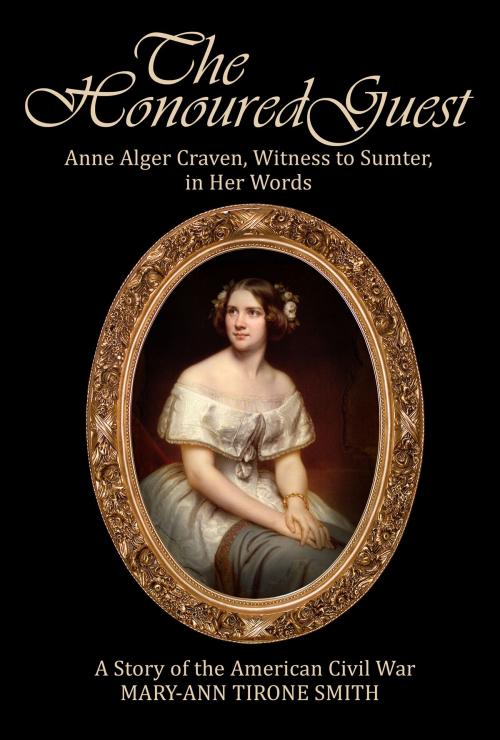The Honoured Guest
Anne Alger Craven, Witness to Sumter, in Her Words
Biography & Memoir, Historical, Fiction & Literature, Literary| Author: | Mary-Ann Tirone Smith | ISBN: | 1230000261638 |
| Publisher: | Mary-Ann Tirone Smith | Publication: | August 20, 2014 |
| Imprint: | Language: | English |
| Author: | Mary-Ann Tirone Smith |
| ISBN: | 1230000261638 |
| Publisher: | Mary-Ann Tirone Smith |
| Publication: | August 20, 2014 |
| Imprint: | |
| Language: | English |
It is November, 1860. Anne Alger Craven leaves her home at Abingdon Square, Manhattan, prepared to enter the lion’s den that is Charleston, South Carolina; Anne is an abolitionist. In Charleston the penalty for supporting emancipation is execution.
But Anne is also a metallurgist, granddaughter of Cyrus Alger, founder of Boston's Alger Iron Works, birthplace of the great cannon, the 50,000 pound Columbiad. Upon the death of her father, Anne inherited the Iron Works and is now the last in the family’s line of ordnance specialists. So when the opportunity arises to travel to the newest and grandest United States fort, Sumter, she cannot resist. She will join with the tiny 1st Artillery regimen to observe the mounting and testing of the very guns she helped develop.
Anne’s husband, Tunis Augustus MacIntosh Craven, United States Navy, commanding the blockade of the Mississippi River aboard the Mohawk has deemed her plan brilliant, but their letters expose his fear for her safety.
Aboard a locomotive bound for Charleston, the metallurgist in Anne is in wonder at traveling annihilating speeds of 30 to 35 miles per hour encased in cast iron.
The first weeks at Sumter surpass all her expectations, and the intimacy of Army life allows Anne to feel part of a tight-knit family, one devoted to gallantry. Then, Abraham Lincoln is elected president, and South Carolina acts on its threat to shred the Constitution and secede from the Union. Major Robert Anderson, Commander of the Federal Installations at Charleston, as an officer and gentleman, must see to Anne’s protection even as she and her band of brothers, along with their wives and children, come to be trapped in the fort on a man-made island in the center of Charleston Harbor.
Four months after Anne’s arrival, the Sumter Company is surrounded by 6,000 bellicose Confederate troops—most untested volunteers—manning state-of-the-art batteries.
And so, a David and Goliath story is set into motion. Major Anderson manages to see to the evacuation of the men’s families, but his eight officers, sixty-four enlisted men—half of them musicians of the regimental band—and one civilian, Anne, all freezing and near to starving, can do nothing but wait for the inevitable hair-trigger act that will bring about war and their destruction.
The first shot is fired. The attack on Sumter becomes a continuous torrent of cannon balls, exploding shells, and canisters filled with white-hot shot. All quarters and barracks are set afire until the entire parade ground is a carpet of flame, every embrasure filled with black smoke and deadly fumes. But the National Banner remains dangling by a single halyard from the snapped flag-staff, and the Company is prepared to fight to the death. Major Anderson has made clear: “Battle leaves no room for sentiment. Kill or be killed.”
In her memoir, Anne Alger Craven exposes the dual-edged sword of what men call honor and glory. From the unique perspective of a woman caught up in the commencement of the Civil War, she reveals exactly how and why the war began, what might have been forestalled, or even prevented, and the horrific catastrophe that followed.
It is November, 1860. Anne Alger Craven leaves her home at Abingdon Square, Manhattan, prepared to enter the lion’s den that is Charleston, South Carolina; Anne is an abolitionist. In Charleston the penalty for supporting emancipation is execution.
But Anne is also a metallurgist, granddaughter of Cyrus Alger, founder of Boston's Alger Iron Works, birthplace of the great cannon, the 50,000 pound Columbiad. Upon the death of her father, Anne inherited the Iron Works and is now the last in the family’s line of ordnance specialists. So when the opportunity arises to travel to the newest and grandest United States fort, Sumter, she cannot resist. She will join with the tiny 1st Artillery regimen to observe the mounting and testing of the very guns she helped develop.
Anne’s husband, Tunis Augustus MacIntosh Craven, United States Navy, commanding the blockade of the Mississippi River aboard the Mohawk has deemed her plan brilliant, but their letters expose his fear for her safety.
Aboard a locomotive bound for Charleston, the metallurgist in Anne is in wonder at traveling annihilating speeds of 30 to 35 miles per hour encased in cast iron.
The first weeks at Sumter surpass all her expectations, and the intimacy of Army life allows Anne to feel part of a tight-knit family, one devoted to gallantry. Then, Abraham Lincoln is elected president, and South Carolina acts on its threat to shred the Constitution and secede from the Union. Major Robert Anderson, Commander of the Federal Installations at Charleston, as an officer and gentleman, must see to Anne’s protection even as she and her band of brothers, along with their wives and children, come to be trapped in the fort on a man-made island in the center of Charleston Harbor.
Four months after Anne’s arrival, the Sumter Company is surrounded by 6,000 bellicose Confederate troops—most untested volunteers—manning state-of-the-art batteries.
And so, a David and Goliath story is set into motion. Major Anderson manages to see to the evacuation of the men’s families, but his eight officers, sixty-four enlisted men—half of them musicians of the regimental band—and one civilian, Anne, all freezing and near to starving, can do nothing but wait for the inevitable hair-trigger act that will bring about war and their destruction.
The first shot is fired. The attack on Sumter becomes a continuous torrent of cannon balls, exploding shells, and canisters filled with white-hot shot. All quarters and barracks are set afire until the entire parade ground is a carpet of flame, every embrasure filled with black smoke and deadly fumes. But the National Banner remains dangling by a single halyard from the snapped flag-staff, and the Company is prepared to fight to the death. Major Anderson has made clear: “Battle leaves no room for sentiment. Kill or be killed.”
In her memoir, Anne Alger Craven exposes the dual-edged sword of what men call honor and glory. From the unique perspective of a woman caught up in the commencement of the Civil War, she reveals exactly how and why the war began, what might have been forestalled, or even prevented, and the horrific catastrophe that followed.















